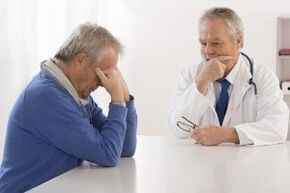According to statistics, about one-third of men after the onset of thirty years of age suffer from prostatitis and nearly half after fifty.

Perhaps the situation is actually quite different, as there is asymptomatic prostatitis (chronic form). Another problem is that many people are just embarrassed or afraid to report their symptoms to a doctor.
The prostate gland is a very important organ of the male body: it is responsible for producing special secretions that mix with semen and maintain normal and healthy sperm activity, as well as sperm resistance to negative facts and conditions.
Symptoms of prostatitis in men
What are the symptoms of prostatitis in men? Common signs of prostatitis in men:
- Potential issues.
- Development of nerve disorders.
- Malaise.
- Pain in the perineum, groin and genitals is short-lived and quickly disappears.
- Presence of discharge from the urethra (most often in the morning), resembling a white sheet.
Below you will find out about the symptoms of prostate inflammation in men.
More about each
How is prostatitis shown in men? The first signs of prostate inflammation in men are frequent urination.
The urge to urinate increases at night and during the day. The process of urinating is accompanied by a painful sensation ("as if cutting") in the lower abdomen. Painful sensations can be chronic and manifest not only during urination. Frequent urination and painful sensations often indicate chronic prostatitis.
Manifestations of prostatitis in men include a constant feeling of full bladder.
After the act is completed, the feeling remains that the bladder is still full. Increases irritation and self-doubt. It can occur in both forms of the development of the disease. Need medical help, because the development of these extreme symptoms is urinary retention in prostatitis.

Blood in the urine with prostatitis is a rare symptom. Can show:
- development of purulent processes and inflammation;
- for trauma;
- for prostatitis with complications - hyperplasia (separate disease, characterized by an increase in the number of structural elements of the tissue, excessive cell formation, treated separately).
Increased fatigue is the result of this disease. First, if there is no treatment, the body will balance the disease itself, which is reflected in mental resources.
Increased itching and fatigue, as well as depressive conditions are possible.
It develops more often in chronic form.
Painful sensation in the perineum and scrotum.
Improves if left untreated. It develops in chronic and acute forms.
Sexual dysfunction. Erection decreases and "subsides", the duration of sexual intercourse is reduced. Spontaneous morning erections also disappear. This is an indirect sign, often indicating a chronic form.
Difficulty during defecation - painful sensation in the rectum during bowel movements, removal of pus is possible. Talk about acute forms.
Excessive sweating indicates a chronic form of the disease. Sweating is often seen in the perineum area. It can be "along" with emotional disorders (due to anxiety and psychogenic factors).
Constipation with prostatitis is also a symptom. How to recognize prostatitis? If you find similar symptoms, it is best to contact a specialist who will make a correct diagnosis.
Consider acute and chronic prostatitis and signs of prostate inflammation in men.
Acute form
How prostatitis manifests itself in men - symptoms:
- A general sense of weakness and severe discomfort.
- Body temperature is one of the symptoms of prostatitis, headaches also occur.
- Symptoms of prostatitis (in the perineum), which increase with urination and defecation.
- Frequent push to the toilet, which is not satisfying - the bladder is not completely empty.
- This in turn increases irritation and nerve irritation. In clinical cases, the development of acute urinary retention is possible.
Chronic form
The course, as a rule, is not symptomatic, the person is practically not making a complaint (or may not be aware of it).

The symptoms of the disease mentioned are almost never observed.
If you do not understand the manifestations of prostatitis, the symptoms, the disease, although persistent, is considered "embarrassing".
A person who feels a general abnormality, suffers from urination, may simply be "unaware" of these symptoms and be unconcerned.
PSA levels can increase in chronic prostate inflammation, but not always. There are many cases when the analysis of men suffering from chronic prostatitis shows that PSA levels are in the normal range. Chronic prostatitis is often undetectable.
In the early stages, prostatitis in men manifests itself as a mild form of acute inflammation of the prostate gland, which is the development of inflammation after bacteria enter the prostate gland through certain channels, for example, through the urethra.
Given that chronic prostatitis is a relatively slow disease, the immune system opposes the occurrence of acute inflammatory processes.
Because inflammation is not completely cured, a persistent inflammatory process remains in the prostate gland, which turns into a chronic form and thus can lead to the formation of scars on the prostate gland at the site of inflammation.
Larger scars can cause prostate gland dysfunction. Like acute prostatitis, chronic prostatitis can be detected by the following symptoms:
Symptoms of prostate inflammation in men (chronic form):
- Squeezing and pain in the perineum and genitals.
- Painful ejaculation.
- Pain in the bladder area.
- Pain and burning during or after urination.
- Draws pain and sensation of pain in the groin area.
- The urge to urinate increases.
- Erectile dysfunction.
Clinical presentation and development
Signs of prostatitis in men indicate that there is an urgent need to see a doctor. Which doctor should I go for prostatitis? Read more here.
The inflammatory process leads to narrowing of the urethral lumen and irritation of the nerve endings, which is manifested by violation of the process of urination (as you know, this often happens at night several times a night, urination is made "in small parts", nofeeling satisfied, which is where the urine is completely empty).
Inflammation of the prostate gland, if started on time, does not cause disruption of the genital area. If the inflammatory process develops sufficiently: libido is inhibited, infertility can develop, the risk of secondary urinary tract infection increases, and chronic kidney failure can develop.
What else can manifestations discuss?
Sexual dysfunction as a symptom of isolation or along with sweating can be a symptom of nervous disorders. For example, chronic stress.

Some of our diseases actually come from nerves.
Sexual dysfunction, by the way, often has a nerve base, and the reason lies in the soul.
In this case, consultation with a psychologist or psychotherapist is required, as a rule, more than one.
Important to note: if we are talking about neural dysfunction, then it should be remembered that, in this case, there will be no inflammation or fever, and no discharge will be observed.
Diagnosis should begin with a physician. Sure, you should start the journey with a psychologist when sexual dysfunction is the only symptom (and even so, you may be advised to apply the necessary tests and see a doctor).
A clear diagnosis can only be made by a doctor after examination and passing the necessary tests. First of all, the presence of discharge or inflammation speaks of a sexually transmitted disease.
All these diseases can be distinguished only by the results of clinical blood tests, smears. And for each disease, its own medication treatment program (e. g. , antibiotic course) can be created.
Who should I contact?
How to diagnose prostatitis? Examination should be started with a urologist and andrologist.
During rehabilitation activities (after primary treatment), it is recommended to visit a physiotherapist, physiotherapist and psychologist to normalize the patient's mental state.
You must listen to expert recommendations carefully, if treatment is prescribed, follow it strictly. Do not forget about preventive measures that will be appropriate after the end of treatment.
Conclusion
Now you know what the symptoms of prostatitis are in men. Organized to prevent hypothermia, strive not to get carried away with spicy and fried foods, alcohol and smoking, and lead a regular sex life. Do not forget about the prevention of sexually transmitted diseases (first of all, you should be protected).
Follow your doctor's recommendations. Try to lead, if not a healthy lifestyle, at least harmless, do not abuse harmful substances (smoking, alcohol). Feel free to report your complaint to your doctor. If your loved one is sick, give them emotional support.






























